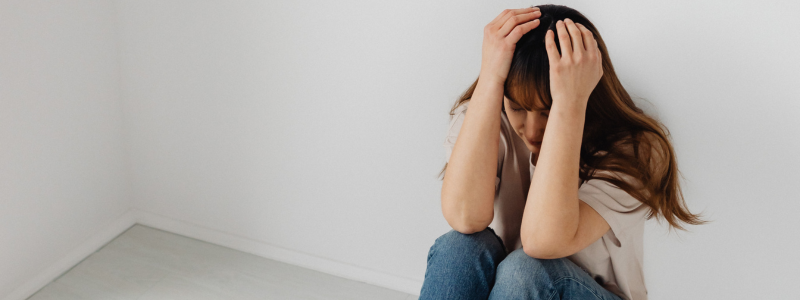
Head of Online Medical Content

Audiology Expert

Hearing Loss and Mental Health
The hidden impact on your emotional well-being
Overview | The invisible burden | Why hearing loss affects mental health | Warning signs to watch for | What you can do | Conclusion
Last Hearing Aid UK Update:
Overview
Hearing loss doesn't just hurt your ears; it also hurts your mind, mood, and quality of life in general. A lot of people know that hearing loss makes it hard to talk to people, but not as many people know how much it can hurt their mental and emotional health.
If you've been having trouble hearing, you might have noticed that you feel more anxious around other people, more tired after a day out, or even that you've stopped doing things you used to love.
These are not signs that you're getting older or that you have flaws in your character; they are real effects of not treating hearing loss. The first step to feeling like yourself again is to understand this link.
The good news is that treating hearing loss can really help your mental health. If you have trouble hearing, you don't have to accept being alone, anxious, or depressed as things that will happen.
The invisible burden
Hearing loss carries an emotional weight that extends far beyond simply missing words in conversation.
When you're constantly straining to hear, asking people to repeat themselves, or pretending you've understood when you haven't, it takes a genuine toll on your mental well-being.
If you have to work extra hard to fill in the gaps in every conversation by lip-reading, watching facial expressions, and putting together context clues to figure out what people are saying, your brain is doing a lot more work than it should.
At the end of a social event or even just a regular day, your mind is so tired that people with normal hearing don't feel it.
Listening fatigue is the constant mental effort that comes with hearing loss. It's one of the most overlooked effects of hearing loss. It's not just tiring; it's the kind of tiredness that makes you want to stay away from the people and things that make you happy.
Related reading: Types of hearing loss
Why hearing loss affects mental health
The connection between hearing loss and mental health isn't coincidental; there are genuine physiological and psychological reasons why one affects the other.
Social isolation and loneliness
A lot of people with hearing loss stop going out with friends when conversations get hard. You might start saying no to dinner invitations, staying away from busy restaurants, or skipping family get-togethers because the thought of having trouble hearing is just too stressful. This slow withdrawal makes you feel alone, which is strongly linked to anxiety and depression.
The funny thing is that even though you're trying to avoid these situations to lower your stress, being alone can make your mental health problems worse. People are social animals, and having meaningful relationships with other people is important for mental health.
Loss of independence and confidence
Hearing loss can make you feel less capable and more dependent on others. If you're missing important information at work, struggling to hear announcements in public places, or finding telephone conversations increasingly difficult, it chips away at your confidence and sense of independence.

Concerns about cognitive decline
Studies have shown that untreated hearing loss can make you more likely to get dementia and other cognitive problems.
Researchers are still trying to figure out exactly how this works, but the idea is that when your brain doesn't get enough sound, the parts that process sound can get worse.
Hearing loss can lead to cognitive decline because it can make people feel alone and less mentally stimulated.
This isn't meant to scare you; it's just to stress how important it is to deal with hearing loss as soon as possible for your long-term mental and cognitive health.
Related reading: Dementia and hearing loss risks
Anxiety and depression
Social isolation, listening fatigue, loss of confidence, and cognitive problems all come together to make a perfect storm for anxiety and depression.
People who don't get treatment for their hearing loss are much more likely to be depressed than people who have normal hearing or use hearing aids.
People with anxiety often worry about social situations, are afraid of missing important information, or just feel uneasy because they can't hear potential dangers or communicate well. Isolation, frustration, and a lower quality of life can all build up over time and lead to depression.
Warning signs to watch for
The changes usually happen over time, and you might not even notice that your hearing problems are making you feel bad. Here are some signs that losing your hearing could be bad for your mental health:
- You're turning down invitations to restaurants, parties, or other social events because you're worried about your hearing. It's okay to want to stay in and be quiet sometimes, but not wanting to be around other people all the time is not.
- You feel tired after social events. Everyone gets a little tired after a busy day, but if you feel really tired after events that require listening and talking, that's listening fatigue at work.
- You're feeling increasingly anxious or worried: Anxiety about whether you'll be able to hear, what people think of you asking them to repeat themselves, or missing important information can become overwhelming.
If you're experiencing persistent worry related to communication situations, hearing loss may be contributing to your anxiety.
- You're getting more and more anxious or worried. You might be worried about whether you'll be able to hear what people think of you, asking them to repeat themselves, or missing important information.
If you're constantly worried about talking to people, hearing loss might be making your anxiety worse.
- You've noticed changes in your mood. Dealing with hearing problems can make you feel more irritable, frustrated, or low than usual. A low mood that lasts for a long time shouldn't be written off as "getting older" or "having a bad patch." Depression can build up over time.
- You're giving up on hobbies and activities. If you've stopped going to your book club, stopped taking evening classes or stopped going to the movies because it's too hard to hear, that's a sign that hearing loss is making your life harder in ways that can hurt your mental health.
What you can do
The good news is that dealing with hearing loss can have a very positive effect on mental health. Studies have shown that people who get hearing aids often feel more confident, interact with others more, and have a better quality of life overall. Many also say they feel less anxious and depressed.
Get your hearing tested
The first step is knowing exactly what you're dealing with, as a comprehensive hearing test will show whether you have hearing loss, what type it is, and how severe. This information is essential for determining the best course of action.
Our audiologists provide thorough hearing assessments, and we can arrange these either in a clinic or in the comfort of your own home if that's more convenient. There's no charge for the consultation, and there's absolutely no obligation.
Consider hearing aids
Modern hearing aids are remarkably sophisticated and can make a genuine difference to both hearing and mental well-being.
They're not the bulky, whistling devices you might remember from years ago; today's hearing aids are discreet, effective, and designed to help you hear naturally in various environments.
The improvement isn't just about volume, as properly fitted hearing aids help you distinguish speech from background noise, follow conversations in busy environments, and engage with the world around you without constant strain and exhaustion.
Many people report that getting hearing aids was transformative not just for their hearing, but for their overall quality of life and emotional well-being.
Stay socially connected
Even whilst you're addressing your hearing loss, make a conscious effort to maintain social connections.
Let friends and family know you're experiencing hearing difficulties, and most people are happy to speak more clearly or position themselves where you can see their face if they understand what you need.
Talk to your GP about mental health concerns
If you're experiencing symptoms of depression or anxiety, it's important to discuss these with your GP. Addressing hearing loss is important, but you may also benefit from additional support for your mental health, whether that's counselling, medication, or other interventions.
The two approaches work together, such as improving your hearing, which addresses one significant contributor to mental health difficulties, whilst mental health support helps you manage the emotional impact of what you've been experiencing.
Conclusion
Hearing loss and mental health are closely linked. The constant effort of trying to hear, the exhaustion of listening fatigue, the frustration of missing conversations, and the gradual social isolation that often develops can all have a big effect on your mental health.
Hearing aids that are up to date can make a big difference in both your hearing and your quality of life. Many people find that dealing with their hearing loss makes them feel more confident, more social, and happier overall.
If you've had trouble hearing and your mental health has gotten worse, like more anxiety, a low mood, social withdrawal, or constant tiredness, it's a good idea to get your hearing checked.
The link is real, and treating the hearing loss often helps with mental health issues as well. Getting your hearing tested for the first time might seem scary, but it could be the first step toward feeling better, both mentally and physically.
Why Choose Us?
- FREE Hearing Tests
- Best Hearing Aids and Prices
- FREE Aftercare for Life
- FREE Home Visits
- 200+ Local Audiologists
- 60 Day Money Back Guarantee
Are you ready to start hearing better and feeling better?
Make an appointment for a free hearing test with one of our trained audiologists.
We'll check your hearing, talk about how it might be affecting your daily life, and go over your options with you, all without any pressure or obligation.
We're here to give you honest, unbiased advice, whether you're thinking about getting hearing aids for the first time, getting a second opinion, or upgrading from the ones you already have.
Other hearing loss awareness articles you might like...
 Hearing aid stigma
Hearing aid stigma  The impact of diet on your hearing
The impact of diet on your hearing  How to tell if hearing loss is permanent or temporary
How to tell if hearing loss is permanent or temporary Watch the The Healing Marathon's video on hearing loss and mental health below
Our specialist service includes:
Do not spend hundreds of pounds without getting a second opinion from us.
Please call us on 0800 567 7621
 Not only are the prices great, but the service is fantastic! Many thanks to your team.
Not only are the prices great, but the service is fantastic! Many thanks to your team.What's included in our hearing aid prices?
Common FAQs about hearing aids and hearing loss
In general, any audiologist will always recommend to you the hearing aid model that best suits your needs. Here is a useful checklist to make sure that is the case.
- Audiologist's level of knowledge: The audiologist you have seen will hopefully have a wide knowledge of all available hearing aids; however, some will only be familiar with a small number of brands and, therefore, may not really be in a position to know which model is the best for you. It is OK to challenge their recommendation and ask them to justify why this particular brand is the one for you.
- Do research: Read about the hearing aid that was recommended. Does it seem like it will suit your lifestyle? Does it have more or fewer features than you need?
- Be aware of sales targets: Many high street retailers have specific tie-ins to a particular manufacturer/brand. The hearing aid they have suggested may still be the correct one for you, but do your research so that you know why they might have recommended it.
If you have significant hearing loss in both ears, you should be wearing two hearing aids. Here are the audiological reasons why:
Localisation: The brain decodes information from both ears and compares and contrasts them. By analysing the minuscule time delays as well as the difference in the loudness of each sound reaching the ears, the person is able to accurately locate a sound source.
Simply put, if you have better hearing on one side than the other, you can't accurately tell what direction sounds are coming from.
Less amplification is required: A phenomenon known as “binaural summation” means that the hearing aids can be set at a lower and more natural volume setting than if you wore only one hearing aid.
Head shadow effect: High frequencies, the part of your hearing that gives clarity and meaning to speech sounds, cannot bend around your head. Only low frequencies can. Therefore, if someone is talking on your unaided side, you are likely to hear that they are speaking, but be unable to tell what they have said.
Noise reduction: The brain has its own built-in noise reduction, which is only really effective when it is receiving information from both ears. If only one ear is aided, even with the best hearing aid in the world, it will be difficult for you to hear in background noise as your brain is trying to retain all of the sounds (including background noise) rather than filtering them out.
Sound quality: We are designed to hear in stereo. Only hearing from one side sounds a lot less natural to us.
Fancy some further reading on this topic? You can read about why two hearing aids are better than one in our article, hearing aids for Both Ears, here
For most people, the main benefit of a rechargeable hearing aid is simple convenience. We are used to plugging in our phones and other devices overnight for them to charge up. Here are some other pros and cons:
For anybody with poor dexterity or issues with their fingers, having a rechargeable aid makes a huge difference, as normal hearing aid batteries are quite small and some people find them fiddly to change.
One downside is that if you forget to charge your hearing aid, then it is a problem that can't be instantly fixed. For most, a 30-minute charge will get you at least two or three hours of hearing, but if you are the type of person who is likely to forget to plug them in regularly, then you're probably better off with standard batteries.
Rechargeable aids are also a little bit bigger and are only available in Behind-the-Ear models.
Finally, just like with a mobile phone, the amount of charge you get on day one is not going to be the same as you get a few years down the line. Be sure to ask what the policy is with the manufacturer's warranty when it comes to replacing the battery.
For most people, the answer is yes. But it's never that simple.
The majority of hearing problems affect the high frequencies a lot more than the low ones. Therefore, open fitting hearing aids sound a lot more natural and ones that block your ears up can make your own voice sound like you are talking with your head in a bucket. Therefore, in-ear aids tend to be less natural.
However, the true answer is we can't tell until we have had a look in your ears to assess the size of your ear canal, and until we have tested your hearing to see which frequencies are being affected.
People with wider ear canals tend to have more flexibility, also there are open fitting modular CIC hearing aids now that do not block your ears.
There is also the age-old rule to consider, that a hearing aid will not help you if it's sat in the drawer gathering dust. If the only hearing aid you would be happy wearing is one that people can't see, then that's what you should get.
Most people can adapt to any type of hearing aid, as long as they know what to expect. Have an honest conversation with your audiologist as to what your needs are.
Generally speaking, six or more. Unless it's none at all. The number of channels a hearing aid has is often a simplistic way an audiologist will use to explain why one hearing aid is better than another, but channels are complex, and it is really not that straightforward. Here are some reasons why:
Hearing aids amplify sounds of different frequencies by different amounts. Most people have lost more high frequencies than low, and therefore need more amplification in the high frequencies. The range of sounds you hear is split into frequency bands or channels, and the hearing aids are set to provide the right amount of hearing at each frequency level.
Less than six channels, and this cannot be done with much accuracy, so six is the magic number. However, a six-channel aid is typically very basic with few other features and is suitable only for hearing a single speaker in a quiet room. The number of channels is not what you should be looking at; it's more the rest of the technology that comes with them.
As a final note, different manufacturers have different approaches. One method is not necessarily better than any other. For example, some manufacturers have as many as 64 channels in their top aids. Most tend to have between 17 and 20. One manufacturer has no channels at all.
Manufacturer's warranties typically last between 2-5 years, depending on the brand and model, and cover defects in materials and workmanship. This includes repairs for component failures, electronic malfunctions, and manufacturing defects, but excludes damage from misuse, accidents, or normal wear. Most manufacturers also include loss and damage insurance for the first year.
We handle all warranty claims on your behalf, liaising with manufacturers and ensuring you get replacement devices quickly when needed. This comprehensive warranty coverage, combined with our lifetime aftercare, gives you complete peace of mind.
Our hearing tests are completely free, whether at our clinics or in your home. Unlike other providers who charge £30-£100 for home visits, we believe hearing healthcare should be accessible without financial barriers. Our comprehensive assessments include examination by a registered audiologist, audiogram results, and personalised recommendations.
All testing, future adjustments, and ongoing support are included at no extra cost. While NHS tests are also free, typical 6-week waiting periods often lead people to seek immediate private testing. We provide prompt, professional assessments that fit your schedule and budget.
Yes, we offer completely free home visits throughout the UK, and this service is included in our prices with no additional charges. Home visits are particularly valuable for people with mobility issues, busy schedules, or those who simply prefer the comfort and convenience of their own environment.
Our audiologists can conduct full hearing tests, fit hearing aids, and provide ongoing support in your home. This service sets us apart from many providers who either don't offer home visits or charge extra for them.
We can offer prices up to 40% lower than high street retailers because of our business model. As a network of 200+ independent audiologists, we don't have the massive overheads of large retail chains - no expensive high street premises, no sales targets pushing audiologists to sell the most expensive options, and no costly marketing campaigns.
However, we maintain the same buying power as the big chains because we purchase on behalf of our entire nationwide network. This means you get access to the same premium hearing aids with professional service, but at genuinely competitive prices.
We offer a comprehensive 60-day money-back guarantee, which gives you twice the industry standard time to properly assess whether your hearing aids are right for you. This extended period recognises that adjusting to hearing aids takes time, and your brain needs several weeks to adapt to the amplified sounds.
Unlike many providers who offer just 30 days, we believe 60 days gives you the confidence to test your hearing aids in all the situations that matter to you - from quiet conversations at home to busy restaurants and outdoor activities.
Other pages you might find useful
Ask the Experts
6 Morton Lane
Walkwood
Redditch
Worcestershire
B97 5QA
Latest Launch
When we refer to a product as 'Latest Launch', we mean it is the latest to be released on the market.
New
When we refer to a product as 'New', we mean that the product is the newest hearing aid model on the market.
When we refer to a product as 'Superseded', we mean that there is a newer range available which replaces and improves on this product.
Older Model
When we refer to a product as an 'Older Model', we mean that it is has been superseded by at least two more recent hearing aid ranges.
